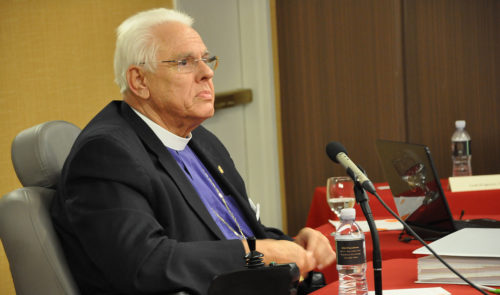Disciplinary panel sanctions Los Angeles Bishop J. Jon BrunoPosted Jun 19, 2017 |
|

Diocese of Los Angeles Bishop J. Jon Bruno spent nearly seven hours March 29 and 30 talking to the Hearing Panel considering the disciplinary action against him. Photo: Mary Frances Schjonberg/Episcopal News Service
[Episcopal News Service] The Episcopal Church ecclesiastical disciplinary panel considering a complaint against Diocese of Los Angeles Bishop J. Jon Bruno has sanctioned the bishop for again trying to sell St. James the Great Episcopal Church.
The Hearing Panel told Bruno on June 17 that he is prohibited from “selling or conveying or contracting to sell or convey the St. James property until further order of the Hearing Panel.”
The original case against Bruno involves his unsuccessful 2015 attempt to sell the church in Newport Beach, California, to a condominium developer for $15 million in cash. That effort prompted the members of St. James to bring misconduct allegations against Bruno. The members alleged Bruno violated Church law. The Hearing Panel is still considering whether or how to discipline Bruno.
One of the complainants in the case contacted the Hearing Panel earlier this month with what is known as a “colorable” or plausible legal claim that Bruno may have entered into another contract to sell the St. James property, according to the panel’s notice. Bruno then refused to confirm or deny the alleged contract.
The Hearing Panel said that if Bruno has tried to sell the church property, or has sold it, before the panel decided the original case against him that conduct is “disruptive, dilatory and otherwise contrary to the integrity of this proceeding.” The same is true of his failure to give the panel the information it asked for about the accusations, the notice said. Such behavior violates the portion of canon law which governs the behavior of clerics who face disciplinary actions (Canon IV.13.9(a) page 151 here).
A hearing on the original accusations, including engaging in conduct unbecoming a member of the clergy took place March 28-30 in Pasadena, California. Attorneys representing the Episcopal Church and Bruno filed written closing briefs a month after the hearing ended. The Hearing Panel has not ruled on the initial complaint.
St. James was one of four properties that the diocese spent close to $10 million in litigation to recover from disaffiliated Episcopalians who broke with the Church over its policies on women’s ordination and the full inclusion of LGBTQI members in the life of the Church, including ordained ministry.
Diocese of Los Angeles Chancellor Richard Zevnik and Vice Chancellor Julie Dean Larsen have asked the panel to dismiss the entire case against Bruno. They have said that a “civil lawsuit, political actions and social media campaign” mounted by members of St. James the Great in Newport Beach were “wrongfully, but successfully and strategically, designed to stop the sale of [the] 40,000-square foot church property” on what is known as Lido Island, a prosperous housing development sporting a yacht club.
The Church’s clergy disciplinary canon, the chancellors argue, is “not intended to be used as a weapon to challenge a diocesan bishop’s decisions regarding the administration and stewardship of his or her diocese.”
Episcopal Church Attorney Raymond “Jerry” Coughlan has said that Bruno is guilty of “serious misconduct” in violating three sections of the Title IV canons: “failing to exercise his ministry in accordance with applicable church canons,” “conduct involving dishonesty, deceit or misrepresentation” and “conduct unbecoming a member of the clergy. He said in his closing brief that the panel must conclude that Bruno’s conduct was “calculated, pervasive and long-running.”
Because of those violations and because “he shows no sign of recognizing even the possibility of his misconduct,” Coughlan recommended that panel suspend Bruno from ministry for at least a year.
However, because he said such a sentence would only exacerbate the conflict and not lead to reconciliation, Coughlan urged the panel to use its “broad authority” to craft a remedy that “looks forward creatively to heal the division now existing in the Los Angeles diocese.”
Bruno turns 72, the Church’s mandatory retirement age, in late 2018. Incoming Bishop Coadjutor John Taylor, his successor, is scheduled to be ordained and consecrated on July 8.
Because none of the previous steps of the Title IV disciplinary process resolved the issue, when the complaints against Bruno got to the point of seating a Hearing Panel, the Episcopal Church replaced St. James as the complainant in the case. Coughlan, representing the Episcopal Church, presented the case to the panel. According to the Title IV process, the Church pays for the costs of the disciplinary process for bishops.
Diocese of Southern Virginia Bishop Herman Hollerith IV is president of the Hearing Panel. The panel, appointed by the Disciplinary Board for Bishops from among its members, also includes Rhode Island Bishop Nicholas Knisely, North Dakota Bishop Michael Smith, the Rev. Erik Larsen of Rhode Island and Deborah Stokes of Southern Ohio.
Previous ENS coverage is here.
– The Rev. Mary Frances Schjonberg is senior editor and reporter for the Episcopal News Service.

Social Menu